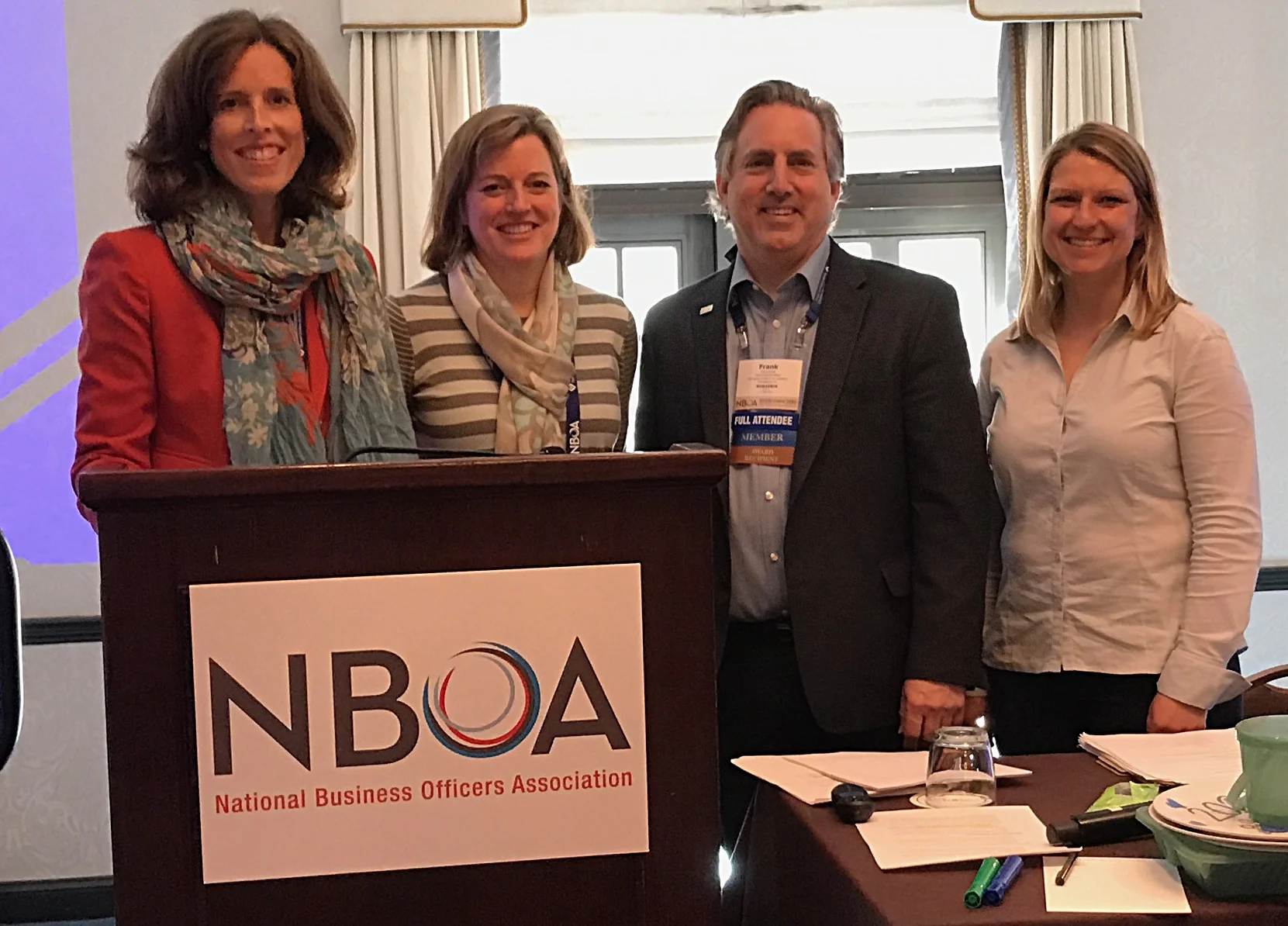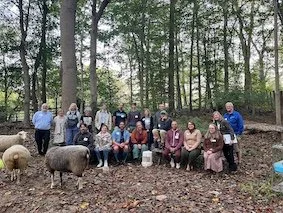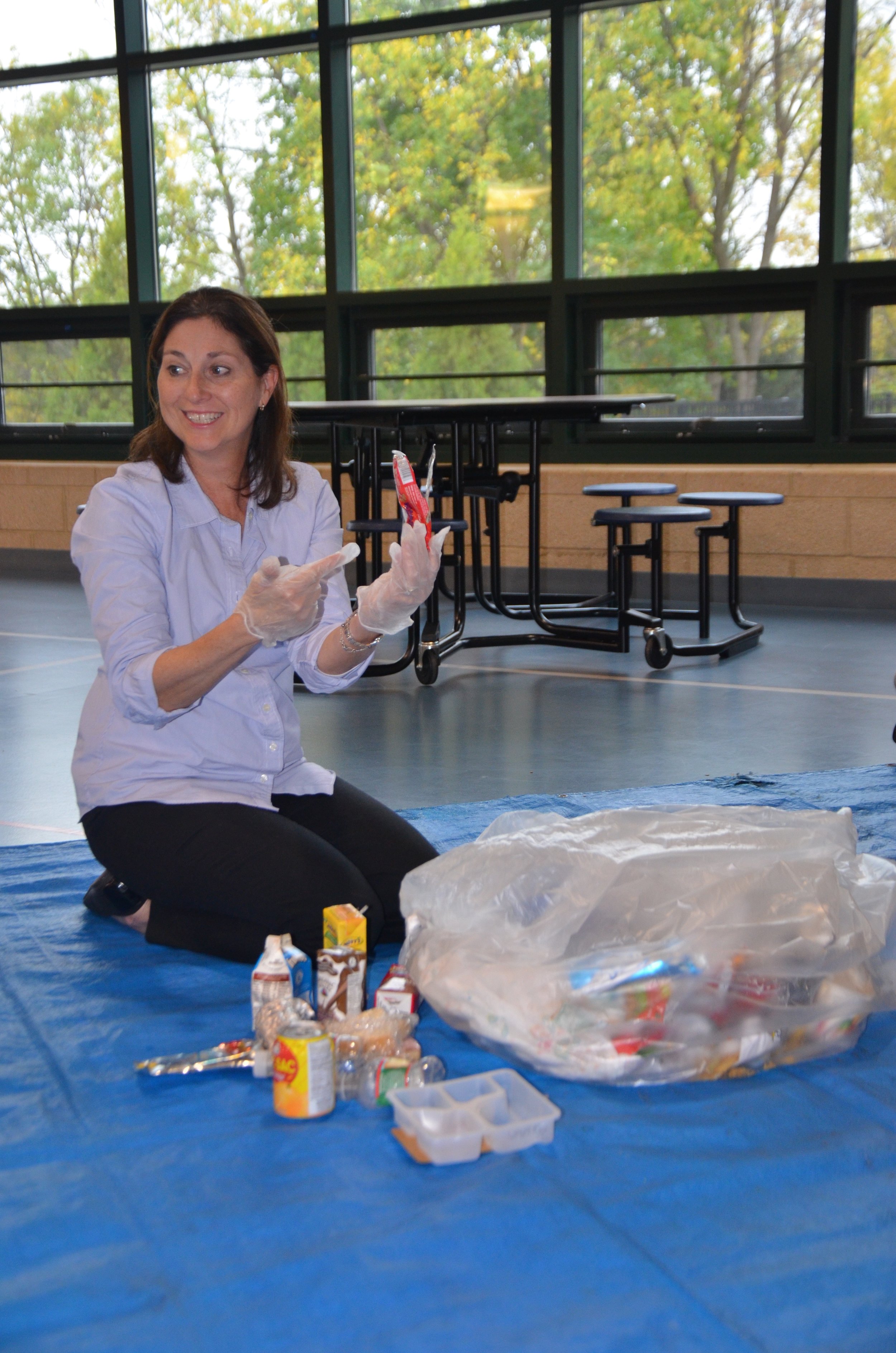Twenty-three educators, sustainability coordinators, and administrators from PAISBOA member schools gathered at The School in Rose Valley (SRV) for the PAISBOA Sustainability meeting, co-organized by PAISBOA and Boyer Sudduth Environmental Consultants (BSEC) on October 9th, 2025. This event provided a space for participants to share ideas, highlight campus initiatives, and strengthen connections around environmental sustainability.
Growing a Sustainable Culture in Our Schools: AIS Hosts the PAISBOA Sustainability Meeting
On Wednesday April 30th, more than 30 educators, sustainability coordinators, and facilities staff from PAISBOA member schools came together for the group’s semiannual sustainability meeting, co-organized by PAISBOA and Boyer Sudduth Environmental Consultants (BSEC). This spring’s gathering was hosted by The Agnes Irwin School (AIS) and offered a space to share ideas, explore campus initiatives, and build connections around school sustainability.
The Hidden Cost of Food Waste and How You Can Address it Locally
Every day, the average American produces 4.9 pounds of trash — a staggering amount that contributes to overflowing landfills and environmental harm. A significant portion of this waste comes from food. In fact, 30-40% of the U.S. food supply is wasted, the equivalent of bringing home three grocery bags and tossing one straight into the trash.
By making small changes, we can reduce waste, save money and help protect the planet. Let's make every day Earth Day, starting with what's on our plates.
Leave the Leaves: A Teachable Moment
Fallen leaves provide crucial winter protection for insects and invertebrates like butterflies, moths, and beetles. For example, wooly bear and great spangled fritillary caterpillars rely on leaves for warmth and food. By participating in the “Leave the Leaves” campaign, schools can support these ecosystems on their own grounds. Imagine designating a section of the schoolyard as a “wild zone” where leaves are left undisturbed, creating a living laboratory for students to observe changes throughout the seasons.
A Picture is Worth a Thousand Words
Composting at Mt. Airy Nexus Made Easy with the Help of Tim Bennett
Composting in Philadelphia has not always been so easy. This is what inspired Tim Bennett of Bennett Compost to start his own company to help make Philadelphia a greener city. Ten years ago while living in a second-floor apartment in South Philly, Tim Bennett struggled to find a facility that would compost his food waste. He quickly discovered that there were no on-site composting site for city residents. This may discourage most folks, but not Tim.
Haverford College’s Green Initiatives: from Elevated Arboretum Status to Dining Hall Changes
National Recognition Drives Excellence in Green Schools
Sharing Sustainability Success in Schools
Last year, the Arlington Public School District (APS) in Massachusetts was one of fifty-eight primary, secondary, and postsecondary schools and school districts to receive national recognition for efforts and achievements in sustainability. Over the course of several years APS invested in improving energy efficiencies by installing solar panels, new natural gas boilers, LED lighting, and energy management systems, among other operational improvements (APS ED-GRS application, 2017). Students and faculty can be found composting, diverting 122,000 pounds of food waste from the landfill each year. Students also have the opportunity to learn about environmental science, energy efficiency and sustainability through recycling and composting programs as well as interactive tools that display energy use and savings.
Through these diligent efforts APS was able to earn the U.S. Department of Education Green Ribbon Schools (ED-GRS) Award. Considered the top honor for green schools, DOE grants ED-GRS awards every year in conjunction Earth Day celebrations. The goal? Inspiration and resource-sharing. “The ED-GRS award was very meaningful,” says Arlington Public Schools Sustainability Coordinator, Rachel Oliveri, “it not only gave us state and national recognition but also led many other communities to reach out and learn from us and exchange ideas.” In a press release after receiving the 2018 award, Superintendent Kathleen Bodie said, “it’s such an honor to be cited on the national level for our efforts and to educate students who see themselves as powerful change makers.”
Developing minds are a distinct target for initiating change, promoting sustainable innovation, and spreading awareness. More than a quarter of the U.S. population is school-aged (0-25), most of whom spend significant portions of their day in educational institutions (and more, if you include faculty and staff) (KFF, 2016). Thus, educational institutions have become exemplars and boiling pots of sustainable transformation. Through efficiency improvements, recycling, composting and other waste-reduction programs along with numerous environmental education opportunities, schools across the country are taking steps (both big and little) towards a more sustainable future for generations to come. ED-GRS awards work as a catalyst to improve infrastructure, experience, and opportunity in schools nationwide by amplifying sustainability success stories and sharing best practices. Green schools “teach students how to lead a changing world, and they support student understanding by modeling sustainable behavior through green operations and building practices” (Center for Green Schools, 2018).
Every year each state can nominate up to six schools and/or districts for consideration by the U.S. Department of Education. Schools that qualify as “green” must demonstrate progress in three main areas, or “pillars” (U.S. Dept. of Education, 2018):
Pillar 1: Reduce environmental impacts and operational costs
Schools with more energy efficient operations spend less on utility costs and are better able to channel resources to education.
Pillar 2: Improve health and wellness
Schools with healthy environments allow students, faculty, and staff to flourish.
Pillar 3: Provide effective environmental and sustainability education
Schools that offer exceptional educational opportunities in hands-on cross-departmental environmental learning (especially STEM and green careers) foster student engagement, civic skills and leadership.
The program has “made a significant impact on the green schools movement,” says ED-GRS Director, Andrea Falken. The DOE now has “an unprecedented platform to address school facilities, health, and environment.” Falken believes in the program’s unique ability to foster collaboration. ED-GRS and it’s affiliated resource-sharing tools have worked to spread awareness of the many free programs that organizations such as NOAA, EPA, and U.S. Departments of Agriculture, Interior, and Energy offer. The program has also enabled collaborations across the for- and non-profit private sectors, Falken says.
While the award itself is strictly non-monetary, the program fosters a funding culture that values and strives for excellence in sustainability. Many states have adopted funding programs specific to sustainability improvement projects, such as Green Building United’s Delaware Pathways to Green Schools Program, which offers mini grants and other resources to promote sustainability improvements in schools. Other states have incorporated sustainability standards and requirements into their existing funding programs for capital improvement projects. In Massachusetts, the School Building Authority (MSBA), which provides funds for most major building projects, sets baseline sustainability standards and provides incentives for going beyond those standards (MSBA, 2011). Matthew Deninger, who works for the Massachusetts Department of Elementary and Secondary Education, serves on the MSBA board, and is the Massachusetts coordinator for ED-GRS, believes that the ED-GRS award program and MSBA funding requirements complement each other quite effectively. “The MSBA baseline standards are pretty high,” Deninger says, “so any school that does a major remodel or new construction project that is funded by MSBA is required to meet those standards. Schools can also opt-in to higher sustainability standards such as LEED-S or NE-CHIPS and gain additional reimbursement points.”
Massachusetts (and many other states) have also used the application process for ED-GRS awards as a means to recognize sustainability efforts big and small within their state. “Even if a school doesn’t quite make it to consideration on the national level, we recognize state finalists and sustained excellence at schools that have already been recognized in past years,” Deninger says. “There’s a tremendous amount of work happening by teachers and students who go above and beyond,” he says, “it’s the least we can do to recognize their efforts.”
Has your school made significant progress on its sustainability goals? If so, you may want to consider applying to be nominated by your state for the ED-GRS award. Application deadlines are approaching - be sure to allow plenty of time for this prestigious application process. Information for all states can be found here or you can follow the links for select states below:
Pennsylvania Department of Education ED-GRS application: education.pa.gov
Due January 4, 2019
Massachusetts Department of Education ED-GRS application: doe.mass.edu
Due January 11, 2019
Delaware Green Building United Green Schools Program: greenbuildingunited.org
Rolling application
Want to make improvements in the three pillar areas at your school? BSEC has experience empowering and guiding schools through the development and implementation of sustainability strategic plans and programs. Contact us for a free phone consult!
You can find more information on the national ED-GRS program here. DOE’s Green Strides platform also offers a user-friendly pool of resources, funding and collaboration opportunities. You can also contact your state ED-GRS coordinator for more information.
Article submitted by Avery Wolfe a recent graduate of Bates College and intern with Boyer Sudduth Environmental Consultants.
A Composter Bin: The Newest Member of NFA Dining Hall
Norwood-Fontbonne Academy (NFA) received a Weavers Way Green Community Projects grant in March 2017. This grant supports a larger initiative to reduce waste, increase recycling and composting, and teach students to minimize their impact on earth. With grant funds, NFA will purchase a new composter that can hold up to 267 gallons of food and yard waste. According to NFA’s chef Annie Bercaw, “We are excited to significantly reduce NFA’s waste production and divert our compostable garbage using this new composter.” Adds Mrs. Nancy Peluso, the Director of Lower Grades, "We are thrilled to receive the Weavers Way Grant as it provides hands-on learning opportunities and supports our commitment to environmental sustainability.”
Published in the Chestnut Hill Local on April 20, 2017, Page 11. Written by Grace Yi, a Nature Preschool Teacher at Schulykill Center for Environmental Education and intern at Boyer Sudduth Environmental Consultants.
Annie Bercaw of Apple Annie's Catering shows the food waste scraps that can be composted.
NFA Wins Grant for Sustainability
Norwood-Fontbonne Academy received a grant from the Philadelphia Area Independent Schools Business Officers Association to address environmental sustainability and foster collaboration between the school and neighboring institutions.
NFA teamed up with its Parents Association, Chestnut Hill College, Morris Arboretum, and Boyer Sudduth Environmental Consultants to create a Collaborative Waste Initiative to reduce waste, increase recycling, and strengthen community ties.
Compost 101: Ancillae-Assumpta Academy Does it Right
Ancillae-Assumpta Academy composts all of its dining room waste with support from their students and faculty. Ancillae-Assumpta’s green initiatives include solar panels, school gardens, outdoor education, to name a few. However, the school decided to do even more. Boyer Sudduth Environmental Consultants lead facilitated meetings with the faculty and administration to identify sustainability goals. Food Service Coordinator Sarah Wade took on composting all food waste generated by students and staff.
Why Compost?
PAISBOA Members Learn About Reducing Cafeteria Waste
On April 27, 2016 PAISBOA's Sustainability Affinity Group gathered to hear how to "Reduce your Environmental Footprint: One Bite at a Time" at Springside Chestnut Hill Academy (SCH). Sustainability consultants Mary Ann Boyer and Anne Sudduth of Boyer Sudduth Environmental Consultants and SCH science teachers, Marianne Maloy and Carie Szalay, used SCH's zero waste initiative as a case study.

















